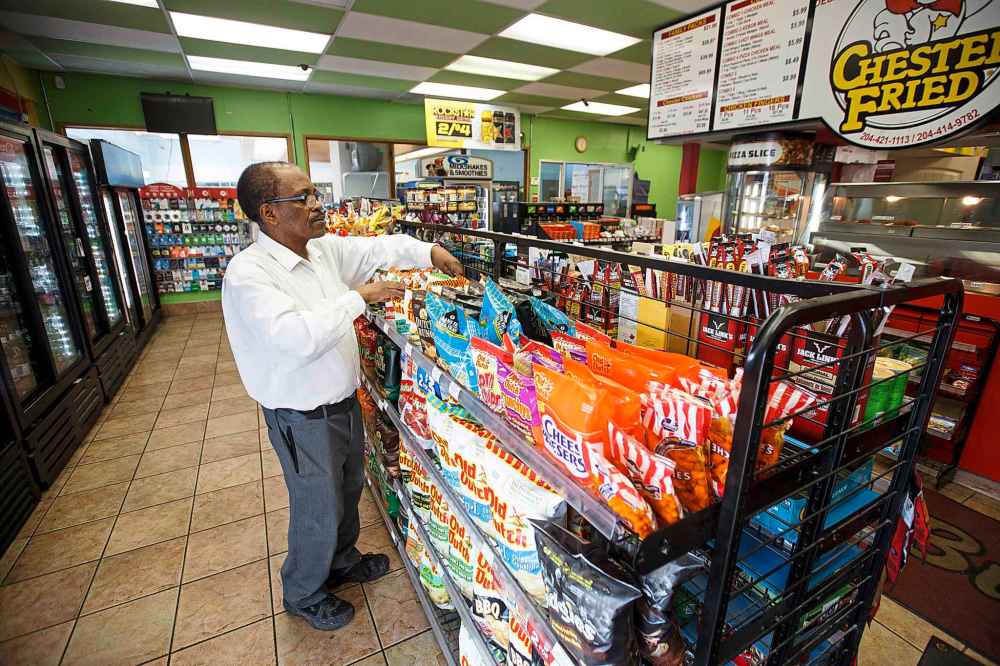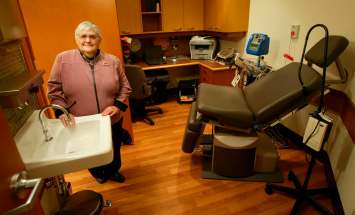Expected influx of newcomers crucial to Manitoba economy: official
Read this article for free:
or
Already have an account? Log in here »
To continue reading, please subscribe:
Monthly Digital Subscription
$19 $0 for the first 4 weeks*
- Enjoy unlimited reading on winnipegfreepress.com
- Read the E-Edition, our digital replica newspaper
- Access News Break, our award-winning app
- Play interactive puzzles
*No charge for 4 weeks then billed as $19 every four weeks (new subscribers and qualified returning subscribers only). Cancel anytime.
Read unlimited articles for free today:
or
Already have an account? Log in here »
Hey there, time traveller!
This article was published 21/06/2018 (2134 days ago), so information in it may no longer be current.
Over the next six years, expect the arrival of 100,000 new Manitobans — not from births, but from immigration.
"We need to start thinking about that at every level," says Ben Rempel, assistant deputy minister with Manitoba Education and Training in charge of immigration.
Without more newcomers, Manitoba’s population will drop because of its low birth rate and aging population, Rempel said Thursday at the Manitoba Interfaith Immigration Council’s annual general meeting at Welcome Place.
He told the staff and supporters at the refugee resettlement agency, newcomers are crucial to the economic success of Manitoba, and the public needs to be reminded of that. Rempel pointed to polls showing Canadians are split 50-50 for and against immigration, with greater support among Manitobans.
!function(e,t,n,s){var i=”InfogramEmbeds”,o=e.getElementsByTagName(t)[0],d=/^http:/.test(e.location)?”http:”:”https:”;if(/^/{2}/.test(s)&&(s=d+s),window[i]&&window[i].initialized)window[i].process&&window[i].process();else if(!e.getElementById(n)){var a=e.createElement(t);a.async=1,a.id=n,a.src=s,o.parentNode.insertBefore(a,o)}}(document,”script”,”infogram-async”,”https://e.infogram.com/js/dist/embed-loader-min.js”);
Manitobans, he said, have felt the benefits of the 20-year-old provincial nominee program that has successfully attracted and retained newcomers with ties to the province and helped to keep the economy chugging along.
"The evidence is mounting that if we don’t grow this country through immigration… it’s going to hit us hard economically, it’s going to hurt our social fabric," said Rempel. "It’s not just nice to do, it’s essential."
Making sure newcomers are integrated and have the tools they need to succeed is key, he said.
The province is looking at a "cradle-to-career strategy" with an international dimension.
"It’s not just about who’s here now, it’s who’s coming," said Rempel. "They’re not here now, but they’re going to be in our schools, they’re going to be in our workplaces, they’re going to be in our communities."
Manitoba also needs to tap the potential of those here now, he said. "How we can support and engage the entrepreneurial energies and spirit of immigrants and refugees already here? There’s a lot of good data suggesting refugees are far more likely to start new businesses than other groups."
Yonas Zewude of Winnipeg is one of those entrepreneurs. Since arriving in Canada as a refugee in 1998, he’s owned eight Mac’s Convenience Stores, and more than 95 per cent of his employees are newcomers. He now owns two businesses and employs 24 people at Walia’s Gas & Car Wash on Isabel Street and the West End phenomenon Bunty’s, which boasts a car wash, convenience store, laundromat, and fast-food service.

"I have big plans to expand," said Zewude, whose business card says: "Proud to be a Canadian Company."
Newcomers keep Manitoba growing
Manitoba has had a net deficit of interprovincial migration since 1984, but its population has grown since 2006, thanks to positive net migration.
International immigration fuelled nearly one-third of total population growth over the last decade, a share that’s expected to rise through 2040.
Manitoba has had a net deficit of interprovincial migration since 1984, but its population has grown since 2006, thanks to positive net migration.
International immigration fuelled nearly one-third of total population growth over the last decade, a share that’s expected to rise through 2040.
Immigration accounted for 81 per cent of Winnipeg’s population growth in 2015-16, and is projected to rise to 92 per cent by 2039-40.
Increasing the population is key to the long-term economic prospects for the province, as it creates confidence for investing in productive capacity and expanding domestic demand.
Manitoba’s population is forecast to remain younger than Canada’s as a whole, but the proportion of Manitobans aged 65 and older is expected to grow to more than 20 per cent by 2040.
The retirement of baby boomers from the labour force will carry significant economic costs, particular the increase demand for health-care services, creating challenges for working-age Manitobans to support consistent service delivery standards while maintaining affordability.
As of 2016, the fertility rate for Manitoba, on aggregate, has fallen to 1.9 births per woman, below the standard replacement rate of 2.1.
Since 2000, the provincial nominee program contributed to 65 per cent of all immigration to Manitoba.
In a period of 10 years, the refugee class’s share of incorporated business had risen from 1.7 per cent of all immigrant business in 2001, to 7.3 per cent in 2010. After a period of adjustment and integration, immigrants have a higher rate of business ownership than Canadian-born residents.
— sources: Immigration, Refugees and Citizenship Canada; Manitoba Education and Training; Conference Board of Canada; Statistics Canada
Zewude said he can’t speak for other refugee entrepreneurs but, for him, Manitoba has been fertile ground for people whose business dreams couldn’t take root in the countries they fled.
"Where we came from, we had a lot of ideas but no freedom or access to opportunity," said Zewude, who is from Ethiopia.
"With somewhere to start, we can be a success," said the married father of three, who has privately sponsored close to 150 people from several countries through Hospitality House Refugee Ministry. "They all are working. Many started their own businesses."
Meanwhile, Rempel applauded Manitoba’s settlement sector for managing the unpredictable flow of refugee claimants crossing into Canada from the United States the last two years.
"So many places around the world are putting up walls to newcomers, and Canada continues to send a welcoming message," he said. "As we look at what’s happening south of the border and in Europe, we can’t risk taking what we have for granted."
carol.sanders@freepress.mb.ca

Carol Sanders
Legislature reporter
After 20 years of reporting on the growing diversity of people calling Manitoba home, Carol moved to the legislature bureau in early 2020.










